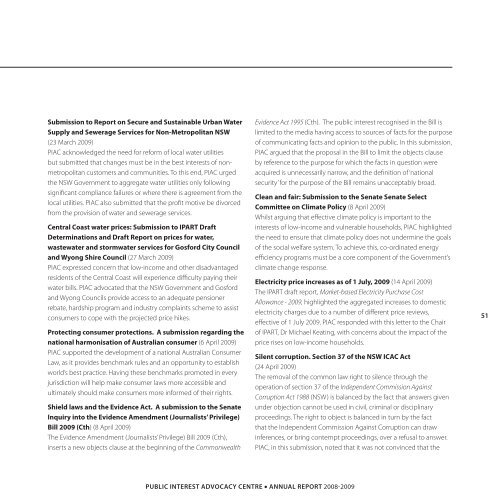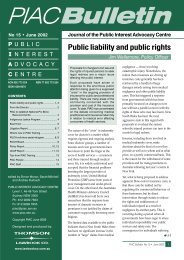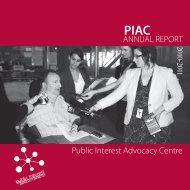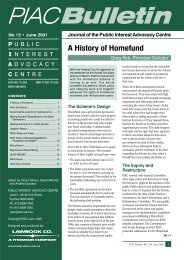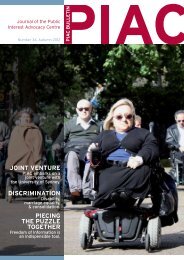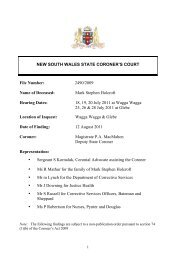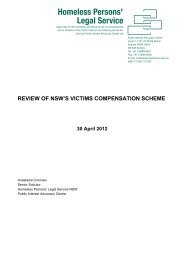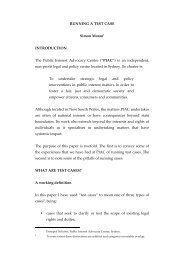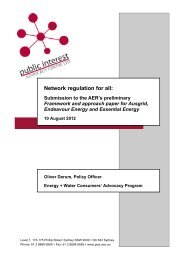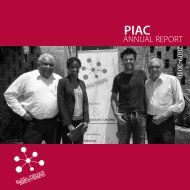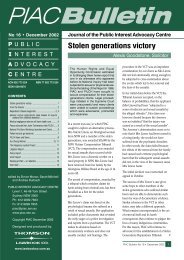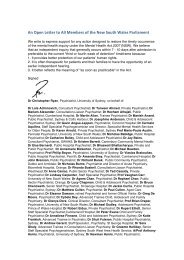annual report 08-09 - Public Interest Advocacy Centre
annual report 08-09 - Public Interest Advocacy Centre
annual report 08-09 - Public Interest Advocacy Centre
You also want an ePaper? Increase the reach of your titles
YUMPU automatically turns print PDFs into web optimized ePapers that Google loves.
Submission to Report on Secure and Sustainable Urban Water<br />
Supply and Sewerage Services for Non-Metropolitan NSW<br />
(23 March 20<strong>09</strong>)<br />
PIAC acknowledged the need for reform of local water utilities<br />
but submitted that changes must be in the best interests of nonmetropolitan<br />
customers and communities. To this end, PIAC urged<br />
the NSW Government to aggregate water utilities only following<br />
significant compliance failures or where there is agreement from the<br />
local utilities. PIAC also submitted that the profit motive be divorced<br />
from the provision of water and sewerage services.<br />
Central Coast water prices: Submission to IPART Draft<br />
Determinations and Draft Report on prices for water,<br />
wastewater and stormwater services for Gosford City Council<br />
and Wyong Shire Council (27 March 20<strong>09</strong>)<br />
PIAC expressed concern that low-income and other disadvantaged<br />
residents of the Central Coast will experience difficulty paying their<br />
water bills. PIAC advocated that the NSW Government and Gosford<br />
and Wyong Councils provide access to an adequate pensioner<br />
rebate, hardship program and industry complaints scheme to assist<br />
consumers to cope with the projected price hikes.<br />
Protecting consumer protections. A submission regarding the<br />
national harmonisation of Australian consumer (6 April 20<strong>09</strong>)<br />
PIAC supported the development of a national Australian Consumer<br />
Law, as it provides benchmark rules and an opportunity to establish<br />
world’s best practice. Having these benchmarks promoted in every<br />
jurisdiction will help make consumer laws more accessible and<br />
ultimately should make consumers more informed of their rights.<br />
Shield laws and the Evidence Act. A submission to the Senate<br />
Inquiry into the Evidence Amendment (Journalists’ Privilege)<br />
Bill 20<strong>09</strong> (Cth) (8 April 20<strong>09</strong>)<br />
The Evidence Amendment (Journalists’ Privilege) Bill 20<strong>09</strong> (Cth),<br />
inserts a new objects clause at the beginning of the Commonwealth<br />
Evidence Act 1995 (Cth). The public interest recognised in the Bill is<br />
limited to the media having access to sources of facts for the purpose<br />
of communicating facts and opinion to the public. In this submission,<br />
PIAC argued that the proposal in the Bill to limit the objects clause<br />
by reference to the purpose for which the facts in question were<br />
acquired is unnecessarily narrow, and the definition of ‘national<br />
security’ for the purpose of the Bill remains unacceptably broad.<br />
Clean and fair: Submission to the Senate Senate Select<br />
Committee on Climate Policy (8 April 20<strong>09</strong>)<br />
Whilst arguing that effective climate policy is important to the<br />
interests of low-income and vulnerable households, PIAC highlighted<br />
the need to ensure that climate policy does not undermine the goals<br />
of the social welfare system. To achieve this, co-ordinated energy<br />
efficiency programs must be a core component of the Government’s<br />
climate change response.<br />
Electricity price increases as of 1 July, 20<strong>09</strong> (14 April 20<strong>09</strong>)<br />
The IPART draft <strong>report</strong>, Market-based Electricity Purchase Cost<br />
Allowance - 20<strong>09</strong>, highlighted the aggregated increases to domestic<br />
electricity charges due to a number of different price reviews,<br />
effective of 1 July 20<strong>09</strong>. PIAC responded with this letter to the Chair<br />
of IPART, Dr Michael Keating, with concerns about the impact of the<br />
price rises on low-income households.<br />
Silent corruption. Section 37 of the NSW ICAC Act<br />
(24 April 20<strong>09</strong>)<br />
The removal of the common law right to silence through the<br />
operation of section 37 of the Independent Commission Against<br />
Corruption Act 1988 (NSW) is balanced by the fact that answers given<br />
under objection cannot be used in civil, criminal or disciplinary<br />
proceedings. The right to object is balanced in turn by the fact<br />
that the Independent Commission Against Corruption can draw<br />
inferences, or bring contempt proceedings, over a refusal to answer.<br />
PIAC, in this submission, noted that it was not convinced that the<br />
51<br />
PUBLIC INTEREST ADVOCACY CENTRE • ANNUAL REPORT 20<strong>08</strong>-20<strong>09</strong>


